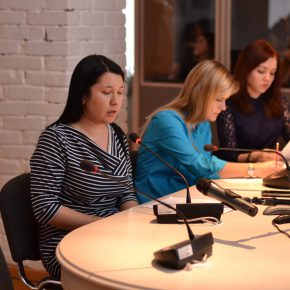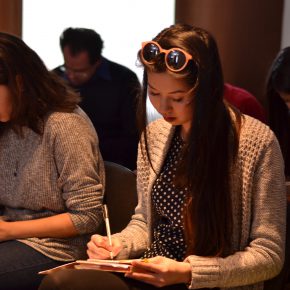The Caspian Higher School of Interpreting and Translation MA students have learnt how to interpret to a “B” language
 This time our students took part in a quadripartite virtual class with the Comillas Pontifical University of Madrid (Spain), the University of Ljubljana (Slovenia) and the University of Geneva (Switzerland). The event was held on March 14 in the frames of the project funded by the Directorate General for Interpretation and Conferences of the European Parliament.
This time our students took part in a quadripartite virtual class with the Comillas Pontifical University of Madrid (Spain), the University of Ljubljana (Slovenia) and the University of Geneva (Switzerland). The event was held on March 14 in the frames of the project funded by the Directorate General for Interpretation and Conferences of the European Parliament.
The class was devoted to cooperation between universities in the digital age. The students of the Caspian Higher School of Interpreting and Translation and of the other partner universities started to discuss this topic last December. That time it was the students who organized and held the event, but this time the students interpreted the speeches delivered by their trainers. The specific feature of the virtual class was that all the students worked from their mother tongue into English, which is their B language, i.e. first foreign language.
The speeches were delivered in Spanish, Russian, French and Slovenian. They were related to advantages of virtual cooperation among universities, modern on-line education as well as to virtual classes for interpreters working in particular areas. Trainer of the Caspian Higher School Ekaterina Krylova told about on-line education development problems and prospects in Russia. Alina Budaeva, a 2-year MA student, interpreted her speech and Gretchen Fernholz, an American trainer who came to Astrakhan State University in frames of Fullbright program, gave comments on her performance. Gretchen highly praised Alina’s performance and gave her some pieces of advice on choosig appropriate words while interpreting into English.
The participants of the class also heard some useful advice given by another trainer of the Caspian Higher School Julia Ibraghimova. She shared her view on how students should work on their B language so that they could fluently interpret into it. Since this language is not their mother tongue, grammar, word choice and time limits become the main problems, which can only be coped with through thorough studying of the language and practicing it at any chance. Such exercises as active reading, paraphrasing and translation can be of great use. One should also remember KISS principle (Keep It Short and Simple): if you use short and simple phrases, your audience will easy understand your interpretation.





